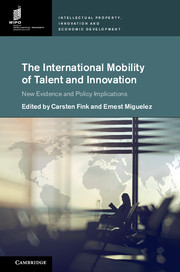Book contents
- The International Mobility of Talent and Innovation
- Intellectual Property, Innovation, and Economic Development
- The International Mobility of Talent and Innovation
- Copyright page
- Contents
- Figures, Tables, and Boxes
- Contributors
- Preface and Acknowledgments
- 1 Introduction
- Part I The International Mobility of Inventors
- Part II Migration, Intellectual Property, Diasporas, Knowledge Flows, and Innovation
- 6 US High-Skilled Immigration, Innovation, and Entrepreneurship
- 7 Diaspora Networks, Knowledge Flows, and Brain Drain
- 8 Intellectual Property Protection and the Brain Drain
- 9 Brain Drain, Intellectual Property Rights, and Innovation in Africa
- Index
- References
9 - Brain Drain, Intellectual Property Rights, and Innovation in Africa
from Part II - Migration, Intellectual Property, Diasporas, Knowledge Flows, and Innovation
Published online by Cambridge University Press: 08 June 2017
- The International Mobility of Talent and Innovation
- Intellectual Property, Innovation, and Economic Development
- The International Mobility of Talent and Innovation
- Copyright page
- Contents
- Figures, Tables, and Boxes
- Contributors
- Preface and Acknowledgments
- 1 Introduction
- Part I The International Mobility of Inventors
- Part II Migration, Intellectual Property, Diasporas, Knowledge Flows, and Innovation
- 6 US High-Skilled Immigration, Innovation, and Entrepreneurship
- 7 Diaspora Networks, Knowledge Flows, and Brain Drain
- 8 Intellectual Property Protection and the Brain Drain
- 9 Brain Drain, Intellectual Property Rights, and Innovation in Africa
- Index
- References
- Type
- Chapter
- Information
- The International Mobility of Talent and InnovationNew Evidence and Policy Implications, pp. 266 - 293Publisher: Cambridge University PressPrint publication year: 2017



